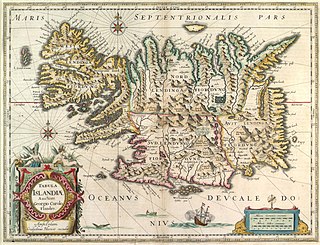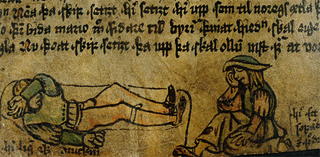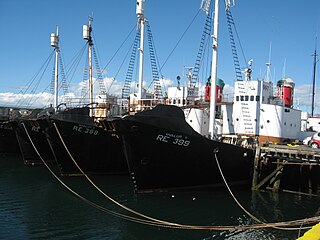Related Research Articles

Iceland ) is a Nordic island country between the North Atlantic and Arctic Oceans, on the Mid-Atlantic Ridge between North America and Europe. It is linked culturally and politically with Europe, and is the region's most sparsely populated country. Its capital and largest city is Reykjavík, which is home to about 36% of the country's roughly 380,000 residents. The official language of the country is Icelandic.

The recorded history of Iceland began with the settlement by Viking explorers and the people they enslaved from Western Europe, particularly in modern-day Norway and the British Isles, in the late ninth century. Iceland was still uninhabited long after the rest of Western Europe had been settled. Recorded settlement has conventionally been dated back to 874, although archaeological evidence indicates Gaelic monks from Ireland, known as papar according to sagas, may have settled Iceland earlier.

The legality of cannabis for medical and recreational use varies by country, in terms of its possession, distribution, and cultivation, and how it can be consumed and what medical conditions it can be used for. These policies in most countries are regulated by three United Nations treaties: the 1961 Single Convention on Narcotic Drugs, the 1971 Convention on Psychotropic Substances, and the 1988 Convention Against Illicit Traffic in Narcotic Drugs and Psychotropic Substances. Since its descheduling in 2020, cannabis is classified as a Schedule I drug under the Single Convention treaty, meaning that signatories can allow medical use but that it is considered to be an addictive drug with a serious risk of abuse.

Icelandic names are names used by people from Iceland. Icelandic surnames are different from most other naming systems in the modern Western world by being patronymic or occasionally matronymic: they indicate the father of the child and not the historic family lineage. Iceland shares a common cultural heritage with the Nordic countries of Denmark, the Faroe Islands, Norway, Sweden and Finland. Unlike other Nordics, Icelanders have continued to use their traditional name system, which was formerly used by all Nordic countries. The Icelandic system is thus not based on family names. Generally, with few exceptions, a person's last name indicates the first name of their father (patronymic) or in some cases mother (matronymic) in the genitive, followed by -son ("son") or -dóttir ("daughter").
Ríkisútvarpið (RÚV) is Iceland's national public-service broadcasting organization.

Islam in Iceland is a minority religion. The Pew Research Center estimated that the number of Muslims in Iceland was below its 10,000 minimum threshold, and official statistics put the figure at under 1,300, or 0.33% out of the total population of 385,230.

Beer in Iceland likely dates back to the island's settlement by Norsemen. In more modern history beer was effectively banned in Iceland for most of the 20th century. Since that ban was lifted in 1989, Iceland's consumption of beer has increased markedly and new breweries have begun to emerge.

Lesbian, gay, bisexual and transgender (LGBT) rights in Iceland rank among the highest in the world.

The cuisine of Iceland has a long history. Important parts of Icelandic cuisine are lamb, dairy, and fish, the latter due to the fact that Iceland has traditionally been inhabited only near its coastline. Popular foods in Iceland include skyr, hangikjöt, kleinur, laufabrauð, and bollur. Þorramatur is a traditional buffet served at midwinter festivals called Þorrablót; it includes a selection of traditionally cured meat and fish products served with rúgbrauð and brennivín. The flavors of this traditional country food originate in its preservation methods: pickling in fermented whey or brine, drying, and smoking.

Whaling in Iceland began with spear-drift hunting as early as the 12th century, and continued in a vestigial form until the late 19th century, when other countries introduced modern commercial practices. Today, Iceland is one of a handful of countries that formally object to an ongoing moratorium established by the International Whaling Commission in 1986, and that still maintain a whaling fleet. One company remains concentrated on hunting fin whales, largely for export to Japan, while the only other one previously hunted minke whales for domestic consumption until 2020, as the meat was popular with tourists. In 2018, Hvalur hf whalers killed a rare blue whale/fin whale hybrid.

Cannabis in California has been legal for medical use since 1996, and for recreational use since late 2016. The state of California has been at the forefront of efforts to liberalize cannabis laws in the United States, beginning in 1972 with the nation's first ballot initiative attempting to legalize cannabis. Although it was unsuccessful, California would later become the first state to legalize medical cannabis through the Compassionate Use Act of 1996, which passed with 56% voter approval. In November 2016, California voters approved the Adult Use of Marijuana Act with 57% of the vote, which legalized the recreational use of cannabis.
Prohibition in Iceland went into effect in 1915 and lasted, to some extent, until 1 March 1989. The ban had originally prohibited all alcohol, but from 1922 legalized wine and in 1935 legalized all alcoholic beverages except beer with more than 2.25% alcohol content. As in many other states with prohibition, "illegal brewing and smuggling of alcoholic beverages were widespread during the ban."

Smoking in Iceland is banned in restaurants, cafés, bars and night clubs as of June 2007. A large majority of Icelanders approve of the ban. At the time the ban went into effect, almost one in four Icelandic people were smokers.

Throughout the Cold War, the nation of Iceland was a member of the North Atlantic Treaty Organization (NATO) and allied with the United States, hosting a US military presence in Keflavík Air Base from 1951 to 2006.

Irreligion in Iceland is prevalent, with approximately 10% of the population identifying as "convinced atheists" and a further 30% identifying as not religious. Since the 20th century, irreligion has seen steady growth.

Cannabis in New Jersey is legal for both medical use and recreational use. An amendment to the state constitution legalizing cannabis became effective on January 1, 2021, and enabling legislation and related bills were signed into law by governor Phil Murphy on February 22, 2021.

Cannabis in Michigan is legal for recreational use. A 2018 initiative to legalize recreational use passed with 56% of the vote. State-licensed sales of recreational cannabis began in December 2019.
The list includes and details significant events that occurred in the global history of national-level implementations of, or changes made to, laws surrounding the use, sale, or production of the psychoactive drug cannabis.

On October 17, 2018, cannabis was legalized in Canada for recreational and medical purposes. It was already legal for medicinal purposes, under conditions outlined in the Marijuana for Medical Purposes Regulations issued by Health Canada, and for seed, grain, and fibre production under licence by Health Canada.
The COVID-19 pandemic in Iceland was a part of the worldwide pandemic of coronavirus disease 2019 caused by severe acute respiratory syndrome coronavirus 2. The virus was confirmed to have reached Iceland in February 2020. As of 4 June 2022, the total number of cases registered was 188,924, of which 153 deaths had occurred. With a total population of about 370,000, the infection rate is about one case per four inhabitants; the infection rate was one of the highest in the world throughout March and April in 2021, though this was attributed to more tests having been carried out per capita in Iceland than any other country, including a screening of the general population run by Icelandic biotech company deCODE genetics to determine the true spread of the virus in the community.
References
- 1 2 Lög um ávana- og fíkniefni 1974 nr. 65 21. maí, www.althingi.is, archived from the original on 6 October 2013, retrieved 2009-02-09
- ↑ Mapes, Terri (20 April 2018). "Marijuana in Iceland". TripSavvy. Archived from the original on 21 August 2021. Retrieved 16 January 2019.
- 1 2 Sveinn Helgason, Magnús (26 August 2015). "Do Icelanders really smoke more cannabis than anyone else?". Iceland Magazine. Retrieved 16 January 2019.
- ↑ "Marihuana og LSD loks bannað hér!" (in Icelandic). No. 235. Tíminn. 25 October 1969. Retrieved 10 December 2016.
- ↑ Helgi Gunnlaugsson; John F. Galliher (January 2000). Wayward Icelanders: Punishment, Boundary Maintenance, and the Creation of Crime. Univ of Wisconsin Press. pp. 92–. ISBN 978-0-299-16534-5.